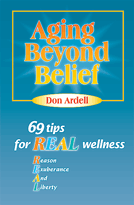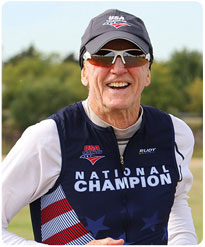Aging well with a healthy lifestyle
From Aging Beyond Belief by Don Ardell
Everybody knows this at one level, but many unconscious desires, hopes, and particularly frustrations occur when the reality is not accepted at the deepest, unconscious level. Getting old is not as good as being young in many ways, aging is part of life. Accept unavoidable facts as cheerfully as possible.
Two systems of concern are bones and muscles. In time, bones become less dense and lose mass and minerals. This, of course, weakens the bones and makes them vulnerable to fracture. Muscles also lose mass and strength, in part due to less water in the tendons and ligaments, leading to added stiffness. The cardiovascular system is affected because the size of the heart increases a little, as does blood pressure. More important, your maximal heart and heart recovery rates diminish. An ambitious fitness routine delays all this substantially.
Unlike your bones and muscles, the decline of other body parts or systems with advancing age are less responsive to vigorous wellness lifestyle practices. That is to say, these systems are going to deteriorate whether you stand on your head, run marathons, eat a perfect diet (whatever that is) and do absolutely everything as well as it can be done. These systems include the following.
- Hearing – the cells of your inner ears are damaged by normal wear and tear of sounds over time. The auditory canal walls become thinner, eardrums thicken and it becomes more difficult to hear higher frequencies.
- Brainpower – the number of brain cells (neurons) diminish with age, though the number of connections between cells increase in some areas of the brain.
- Kidneys – the size of your kidneys and bladder capacity are reduced. The kidneys become less efficient at removing wastes from the blood.
- Reproduction – men produce fewer sperm and suffer loss of testosterone; women produce less estrogen, progesterone and testosterone, for starters.
- Eyesight – There are losses in ability to produce tears, the retina gets thinner and the lens yellows. Almost everyone over forty learns the meaning of the word “presbyopia,” a visual condition in which loss of elasticity of the lens of the eye causes defective accommodation and inability to focus sharply for near vision.
- Skin – you really do become “thin skinned,” or at least your skin thins even if you don’t become quick to take offense. Also, your sweat and oil (sebaceous) glands are less active and skin moisture decreases.
- Nails – Grow half as fast as they used to. Who cares? I suppose some women do, but of all the inevitable changes, this is one I won’t mind in the slightest.
Of course you never know, there may be extraordinary advances in the years to come. All you have to do is live long enough in order to benefit. However, be careful – some advances might never come to pass, in which case you could find yourself hanging around, waiting forever.
Many advances are on the horizon it seems. Scientists just might develop impressive new memory-boosting strategies and life extension techniques. How? The possibilities are limitless. Maybe the key will be found in estrogen or testosterone. Maybe proteins of some kind or stem cells or gene therapies will be used to solve neurological problems associated with aging that will preserve cognitive function, prevent or cure Alzheimer’s, asthma, infectious diseases – and aging itself. Maybe, but probably not in time to work for you. The best strategy is to adopt a wellness lifestyle.
We can greatly affect the quality of our lives. Life quality is very much subject to lifestyle actions, even if the ratio between birth and death will always to one to one. Clearly being old isn’t what it used to be. A wellness lifestyle will allow you to remain younger in important ways as long as possible. Live well and enjoy each day!
Donald Ardell is the author of Aging Beyond Belief: 69 tips for REAL wellness. R = Reason, E = Exuberance, A = And, L=Libery. 





